#executive functioning
Explore tagged Tumblr posts
Text
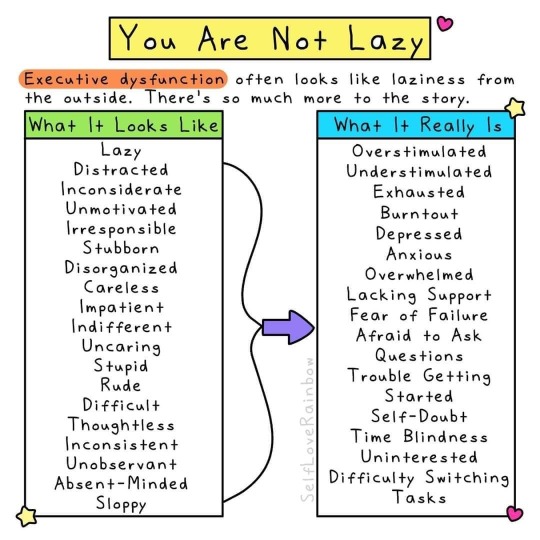
You Are Not Lazy
Executive dysfunction often looks like laziness from the outside. There's so much more to the story.
What It Looks Like: What It Really Is:
Lazy — Overstimulated
Distracted — Understimulated
Inconsiderate — Exhausted
Unmotivated. — Burntout
Irresponsible — Depressed
Stubborn — Anxious
Disorganized — Overwhelmed
Careless — Lacking Support
Impatient — Fear of Failure
Indifferent — Afraid to Ask Questions
Uncaring — Questions
Stupid — Trouble Getting Started
Rude — Uninterested
Thoughtless — Time Blindness
Inconsistent — Time Blindness
Unobservant — Uninterested
Absent Minded — Difficulty Switching Tasks
Self Love Rainbow
#neurodivergence#neurodiversity#actually neurodivergent#executive functioning#executive dysfunction#what it really is#feel free to share and reblog#Self Love Rainbow (Facebook)
2K notes
·
View notes
Text
Bad days do not erase your progress
Bad days do not erase your progress
Bad days do not erase your progress
Bad days do not erase your progress
Bad days do not erase your progress
Bad days do not erase your progress
Bad days do not erase your progress
Bad days do not erase your progress
Bad days do not erase your progress
Bad days do not erase your progress
Bad days do not erase your progress
Bad days do not erase your progress
Bad days do not erase your progress
Bad days do not erase your progress
Bad days do not erase your progress
Bad days do not erase your progress
Bad days do not erase your progress
Bad days do not erase your progress
Bad days do not erase your progress
Bad days do not erase your progress
Bad days do not erase your progress
Bad days do not erase your progress
Bad days do not erase your progress
Bad days do not erase your progress
Bad days do not erase your progress
Bad days do not erase your progress
Bad days do not erase your progress
Bad days do not erase your progress
Bad days do not erase your progress
Bad days do not erase your progress
Bad days do not erase your progress
Bad days do not erase your progress
Bad days do not erase your progress
Bad days do not erase your progress
Bad days do not erase your progress
Bad days do not erase your progress
Bad days do not erase your progress
Bad days do not erase your progress
Bad days do not erase your progress
Bad days do not erase your progress
Bad days do not erase your progress
Bad days do not erase your progress
Bad days do not erase your progress
Bad days do not erase your progress
Bad days do not erase your progress
Bad days do not erase your progress
Bad days do not erase your progress
Bad days do not erase your progress
Bad days do not erase your progress
Bad days do not erase your progress
Bad days do not erase your progress
Bad days do not erase your progress
Bad days do not erase your progress
Bad days do not erase your progress
Bad days do not erase your progress
Bad days do not erase your progress
Bad days do not erase your progress
Bad days do not erase your progress
Bad days do not erase your progress
Bad days do not erase your progress
Bad days do not erase your progress
Bad days do not erase your progress
Bad days do not erase your progress
Bad days do not erase your progress
Bad days do not erase your progress
Bad days do not erase your progress
Bad days do not erase your progress
Bad days do not erase your progress
Bad days do not erase your progress
Bad days do not erase your progress
Bad days do not erase your progress
Bad days do not erase your progress
Bad days do not erase your progress
Bad days do not erase your progress
Bad days do not erase your progress
Bad days do not erase your progress
Bad days do not erase your progress
Bad days do not erase your progress
Bad days do not erase your progress
Bad days do not erase your progress
Bad days do not erase your progress
Bad days do not erase your progress
Bad days do not erase your progress
Bad days do not erase your progress
Bad days do not erase your progress
Bad days do not erase your progress
#i'm sorry#i'm still learning#how to be human#and I#keep fucking up#empathy#and#executive functioning#fucking brain#damage#i don't feel like a person
11 notes
·
View notes
Text
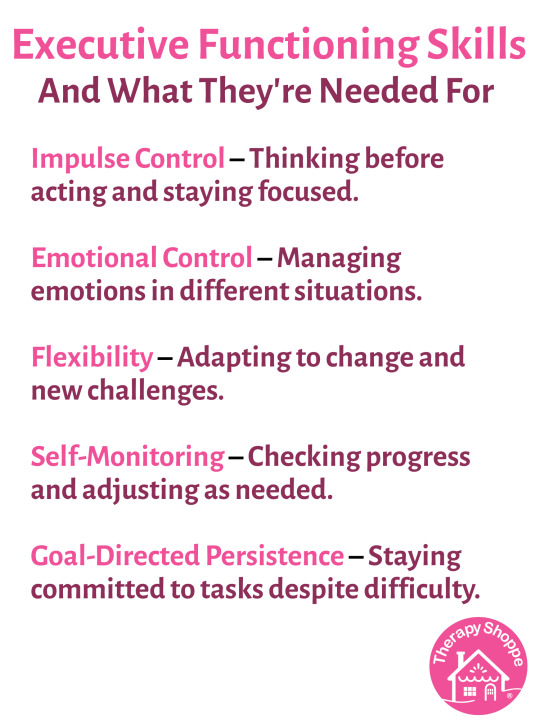
#therapyshoppe#the therapy shoppe#neurodivergent#neurodiversity#autism#executive dysfunction#executive function#executive functioning#actually autistic
12 notes
·
View notes
Text
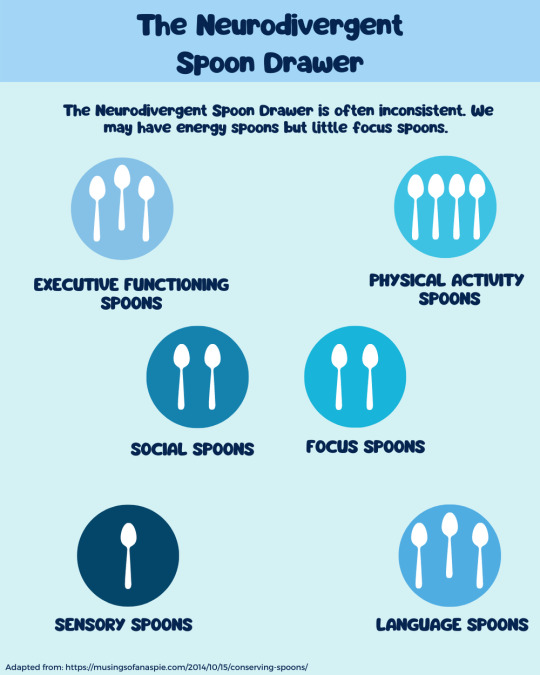
Discovered the "Neurodivergent Spoon Drawer" today!
Source: https://neurodivergentinsights.com/the-neurodivergent-spoon-drawer-spoon-theory-for-adhders-and-autists/
In solidarity,
- A
#neurodivergent#neurodiversity#spoon theory#spoon drawer#executive function#executive functioning#sensory#sensory processing#disability#disabilities#accessibility#ADHD#audhd#Autism#autism spectrum disorder
10 notes
·
View notes
Text
hey. late diagnosed and otherly disabled adhders. help pls.
how do you go about gameifying/incentivizing the shit you have to do so that you actually get it done? and/or when the paralysis/inertia has you trapped?
i was initially diagnosed at like 7 or 8 but have never been in actual treatment for adhd because my other diagnosis took precedent. now that the others are managed/in remission, the adhd is BAD and VERY apparent
#ri speaks#advice#adhd#audhd#actually adhd#actually audhd#neurodivergent#neurodiversity#add#attention deficit disorder (add)#attention deficit hyperactivity disorder#attention deficit disorder#executive dysfunction#executive functioning#neurodivergent tips
22 notes
·
View notes
Text
I always feel proud of myself after I go grocery shopping.
This is self care too.
20 notes
·
View notes
Text
My executive functioning got lost in a forest somewhere
#this was intended to be in the tags of a previous post but it got lost#I'm leaving it though because why not#garlic posts#executive functioning#nature
9 notes
·
View notes
Text
ADHD & Autism
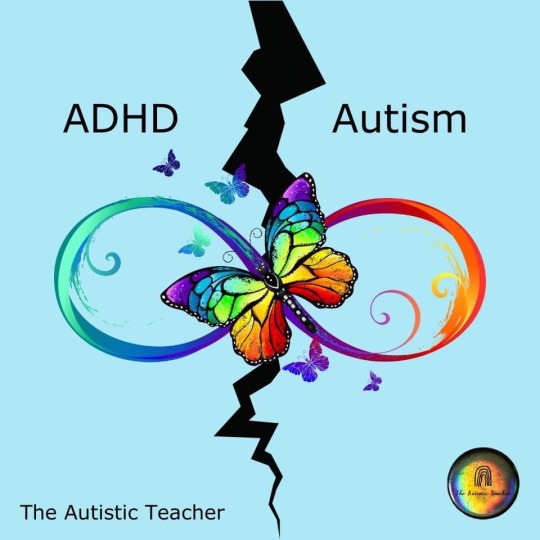

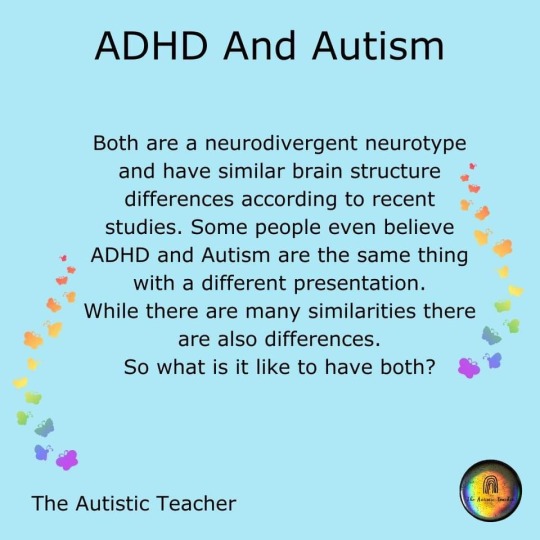




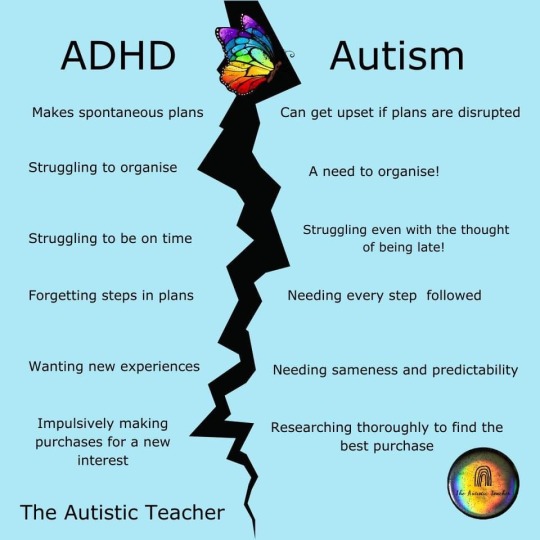
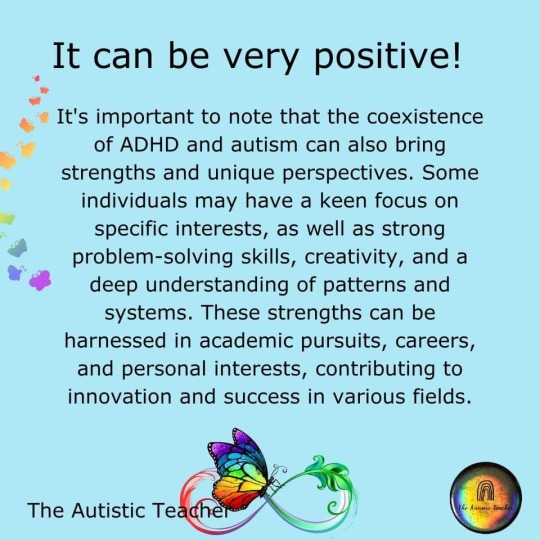
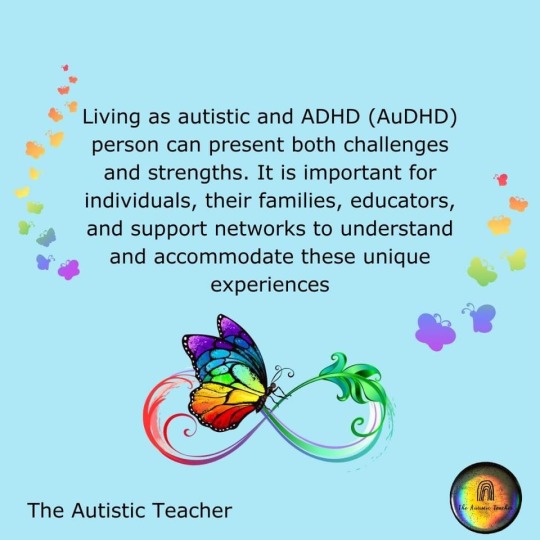
The Autistic Teacher
#autism#actually autistic#adhd#adhd post#adhd & autism#both go together#sensory input#socializing#executive functioning#neurodivergence#neurodiversity#actually neurodivergent#feel free to reblog/share#The Autistic Teacher (Facebook)
572 notes
·
View notes
Text

#audhd brain#actually audhd#my audhd#actually autistic#actually neurodivergent#audhd things#adhd memes#audhd memes#executive dysfunction#executive functioning#star trek#star trek memes#audhd problems#adult autism
5 notes
·
View notes
Text
Can anyone recommend a cookbook and/or book about eating/food prep that is written for autistic adults? (or neurodivergent adults in general)
I'm not looking for recipes so much as ideas and tips for branching out to new, healthier food choices, especially in regards to sensory needs.
#Cookbook#Recipe#Autistic adult#Autism spectrum#Neurodivergent#Cooking#Food prep#Sensory#Executive functioning#I got a few good tips (esp. For my hands/back) from a cookbook for disabled folks but looking for more#Obviously if anyone has tips about this please add on too!
7 notes
·
View notes
Text
I lost an event ticket of my wife's for today. She didn't really want to go, so she's not mad about it. Is it partially her fault for giving it to me? Yes. Does that make me feel any better that we have piles of clutter because I don't have the spoons to deal with them? No.
Thing is, I was the functional frontal lobe in this household for many years, and ten years ago it would've been fine. Why is this harder now? Age? Covid? The cognitive load of having children? Electing dictators?
Not sure, but it sucks, and I feel miserable. Not looking for pity or even empathy, just throwing it out there.
2 notes
·
View notes
Text
A lot of my executive functioning issues genuinely seem to be just "I would rather be reading this interesting thing on the internet"
When I'm unemployed, I find it difficult to apply for jobs or do other productive tasks, partly because, when my time is unstructured and feels unlimited, it's very hard for me to stop myself from reading interesting things on the internet
When I am employed, I am generally able to wake up and get myself to my job without issues. However, I do sometimes have difficulty going to bed early enough and getting enough sleep, partly because it's hard for me to stop myself from reading interesting things on the internet when I know the alternative is going to sleep and having to wake up for work in the morning. I often end up bookmarking a bunch of tabs when I do eventually go to bed
I feel like there are multiple tangents I could go on here, including "sometimes I wonder if I have some form of ADHD after all", "I have an unholy number of internet bookmarks going back to 2015 when I was in college", and "I find it difficult to imagine what I would have been like as a person if I had been born a few decades earlier and thus didn't grow up with the internet". But I can leave those for another time
13 notes
·
View notes
Text
Shouldn't
Today, I saw my therapist for the first time in two years. This was by choice- I was doing better, then recently not so good. As we were catching up, I was telling her about an incident that happened where I forgot something, and had all these false memories associated with it. We talked about object permanence, working memory, nothing I hadn't heard before. She assured me what I was saying was not unusual for ADHD, I wasn't meant to worry it was dementia or anything.
We talked about the journaling I've been doing and not doing, eating and exercise habits, and I was describing the rituals I go through to try to organize my days. Towards the end of the session she looked at me and said, "it shouldn't be this hard", and I wanted to break into a million pieces.
She's right. It shouldn't be this hard. To remember events I'm excited about and want to go to. To remember a grocery list. To not forget your purse at a restaurant for 4 days. To just do that thing you've been putting off for a month that will only take 20 minutes. I shouldn't require complicated and intricate systems just to live my life in a semi-normal way. The more moving parts, the more likely the system is to fail, but the less moving parts and the likelihood of it happening at all decreases drastically.
This year for me has been about examining my current systems to see what is working or what isn't, and maybe the problem is that there are multiple systems at all. When I tried meds the first time, I felt like the benefit I was getting wasn't worth the side effects. After the meltdown I had last week which led to a tear-drenched primal scream of rage and frustration in my garage, maybe it's time to give them another shot.
My therapist was right- it shouldn't be this hard. And if I can take advantage of all the options that are available to me, maybe it won't have to be this hard anymore.
#adhd#neurodivergent#neurospicy#coping mechanisms#therapy#mental health#options#executive functioning#memory
5 notes
·
View notes
Text
Everything takes maintenance. My car needs oil changed, my desk needs tidying, my trash cans need emptying, my face needs washing, my body needs fuel, my sinks need scrubbing, my tablet needs to be backed up...
Things constantly need to be done, just to maintain equilibrium.
And every task is made up of smaller tasks. And those are made of smaller tasks. And every task can have a reason it’s difficult. Every task is something I can be distracted from by something unexpected, like suddenly forgetting why I stood up three seconds ago.
I can’t make myself focus on something. I can’t make myself stop focusing on something. I can’t stop myself from getting distracted by a tangent. I can’t remember what task I was just interrupted from.
I was taught to clean, but I was never taught to maintain cleanliness. Focus shifts and things get set aside, other things get accessed, repeat. Putting things away when you’re done with them only works if you’re done with them. Half-finished and half-started projects abound (and they’re very distracting when I’m trying to tidy).
I know how to make appointments, but I don’t notice the passing of time. I know how to brush my teeth, but I have no morning/evening routine. I know my linens need changing, but I can wait another day, right?
I know the things I keep not doing, but I just don’t have the initiative to get started. I can’t allocate focus to where it needs to go.
And I also don’t get strong dopamine rewards from accomplishing things... so there’s very limited brain chemistry reinforcement of good habits.
I’m not lazy. I’m too overwhelmed to do anything.
3 notes
·
View notes
Text
Sometimes self care is exhausting when you have when adhd. Because like, I'm supposed to
Brush my teeth,
Floss,
Wash my face,
Put on facial moisturizer,
Brush my hair, and
Massage oil on my cuticles
at least once a day? But I did all of that yesterday!
4 notes
·
View notes
Text
I hate the term 'careless mistake' when related to ADHD because a lack of due care usually isn't the cause.
Usually it's automated processes such as information processing, working memory, or attention regulation that leads to the mistake
If you're looking for ways to prevent 'careless mistakes,' please start by acknowledging you do, in fact, care.
Then let's find the root of the problem and address that. For example, you can set up the information in a way that's easier for you to process (eg. visual vs written)
Changing the way that you have the information is presented, such as going through the first time using words then the second time as visuals is particularly helpful.
Reducing compound items (where three steps are written as one single step) can help too.
Also, everyone normalizes to information, steps, or lists over time, so it is not abnormal, wrong, or bad to have someone else check if you missed something obvious.
If you don't have someone to check, put it down and check it later, especially after a mood shift or a cognitively different task. This can help you to focus on different details.
Combining this with changing the way the information is presented is particularly helpful, imo
16 notes
·
View notes